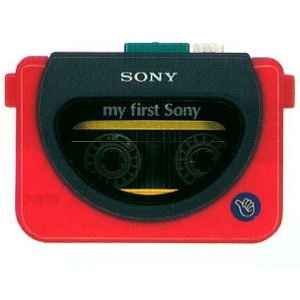This early auto-reverse model followed the WM-7/WM-17, but was simpler and cheaper. ≡
The new generation 17X series single-player has three different styles. The 170 is a traditional black.
In contrast to 170 drab black, 171 is painted with a premium pearl white finish.
The 1989 SONY wm-172 adopts a titanium color body with a sense of technology ≡
This milestone walkman was the second walkman after the legendary TPS-L2 and set the form factor for the DD line. ≡
Product developed based on creating a Walkman roughly the size of a cassette case. ≡
The WM-22 was the first Walkman model that was sold in the UK for under £30. ≡
This model appears identical to the WM-24, except for the grey finish and the slightly revised styling of the cassette door. The sombre colour scheme was clearly aimed at a more mature user.
The successor of the revolutionary WM-10, an incredibly compact walkman. In US and Canada known as WM-10II.
One of the My First Sony range, aimed at kids. Front and rear window, the latter showing the mechanism. Object in the rear view window are closer than they appear? ≡
My first Sony, aimed at kids. No frills, low cost, and durable. Window is showing mechanism, not cassette. Not suitable for children under 36 months.
A simple Walkman with 3 band equalizer.
WM-33 and WM-43 feature a status LED, WM-32 does not.
Came with the MDR-010L headphones. ≡
It is a My First Sony WM-3500 in a transparent housing.
Standard, low cost Walkman in light/baby blue with Dolby B.
In Canada and US released as WM-68.
WM-F38 and F68 use the same mechanism.
The excellent generation Sony Walkman is impeccably finished in fine satin gold and exudes a luxurious gold bling look.
This second-generation budget model replaced the WM-1. Offering similar facilities, it was three quarters of the size. ≡
In the WM-10 family of super small Walkmans, now with the controls on the front (instead of top), and auto-reverse.



















